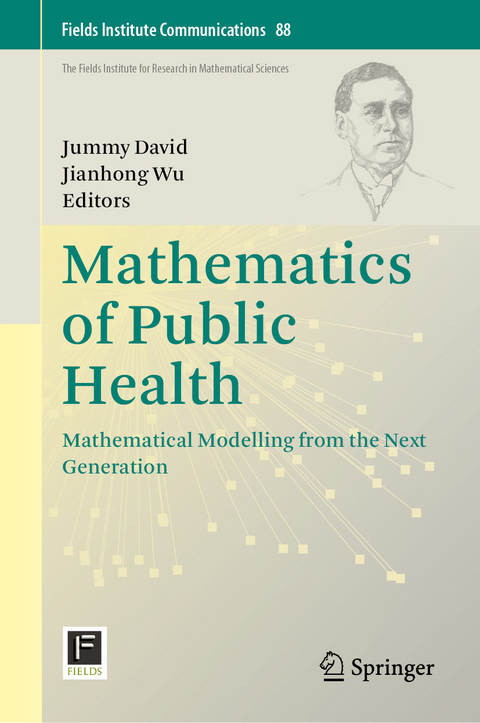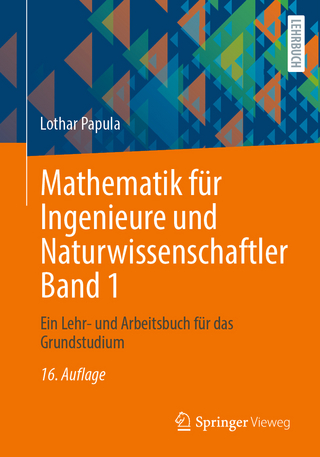
Mathematics of Public Health
Springer International Publishing (Verlag)
978-3-031-40804-5 (ISBN)
This volume addresses SDG 3 from a mathematical standpoint, sharing novel perspectives of existing communicable disease modelling technologies of the next generation and disseminating new developments in modelling methodologies and simulation techniques. These methodologies are important for training and research in communicable diseases and can be applied to other threats to human health. The contributions contained in this collection/book cover a range of modelling techniques that have been and may be used to support decision-making on critical health related issues such as:
- Resource allocation
- Impact of climate change on communicable diseases
- Interaction of human behaviour change, and disease spread
- Disease outbreak trajectories projection
- Public health interventions evaluation
- Preparedness and mitigation of emerging and re-emerging infectious diseases outbreaks
- Development of vaccines and decisions around vaccine allocation and optimization
lt;b>Jummy David is currently a public health analytics and modeling fellow at the Centers for Disease Control and Prevention (CDC), USA. Prior to CDC, she was a postdoctoral fellow at York University, and obtained her PhD (2020) and Master's degree from the University of British Columbia, Canada. She is an applied mathematician, a computational and research-driven scientist with in-depth, hands-on advanced mathematical modeling and simulation methods. She is great at leveraging on analytics and quantitative experiences to develop and analyze mechanistically relevant mathematical models, PK/PD models, and health economic models. Results of her modeling and simulation analysis are used to evaluate, forecast, predict, optimize and accelerate policy designs toward improving decision making in public health, medicine, computational biology and science.
Jianhong Wu is the founding Director of the Laboratory for Industrial and Applied Mathematics, and the Inaugural Director of the York Emergency Mitigation, Engagement, Response, and Governance Institute. He holds the life-time title of University Distinguished Research Professor, the Canada Research Chair (2001-2022) and York Research Chair (2022-) in Industrial and Applied Mathematics at York University. He was also awarded the NSERC/Sanofi Industrial Research Chair in Vaccine Mathematics, Modelling and Manufacturing in 2017-2022. He is an elected Fellow of the Canadian Academy of Health Sciences, and Fellow of the Royal Society of Canada. He received the 2003 Canadian Applied and Industrial Mathematical Society's Research Prize and the 2019 CAIMS-Fields Industrial Mathematics Prize, for his contribution to the following fields: nonlinear dynamics and delay differential equations; neural networks and pattern recognition; mathematical ecology and epidemiology; big data analytics.
Preface.- Mathematical models: perspectives of mathematical modelers and public health professionals.- Discovering first-principle of behavioural change in disease transmission dynamics by deep learning.- Understanding Epidemic Multi-Wave Patterns via Machine Learning Clustering and the Epidemic Renormalization Group.- Contact Matrices in Compartmental Disease Transmission Models.- An optimal control approach for public health interventions on an Epidemic-Viral model in deterministic and stochastic environments.- Modeling airborne disease dynamics: progress and questions.- Modelling mutation-driven emergence of drug-resistance: a case study of SARS-CoV-2.- A Categorical Framework for Modeling with Stock and Flow Diagrams.- Agent-Based Modeling and its Tradeoffs: An Introduction & Examples.- Mathematical assessment of the role of interventions against SARS-CoV-2.- Long term dynamics of COVID-19 in a multi-strain model.
| Erscheinungsdatum | 03.01.2024 |
|---|---|
| Reihe/Serie | Fields Institute Communications |
| Zusatzinfo | X, 317 p. 119 illus., 113 illus. in color. |
| Verlagsort | Cham |
| Sprache | englisch |
| Maße | 155 x 235 mm |
| Gewicht | 608 g |
| Themenwelt | Mathematik / Informatik ► Mathematik ► Angewandte Mathematik |
| Mathematik / Informatik ► Mathematik ► Wahrscheinlichkeit / Kombinatorik | |
| Schlagworte | Agent-based Models • climate change • Compartmental models • Covid-19 • Mathematical epidemiology • Mathematics for Public Health Next Generation Network • Modeling Infectious Diseases • opioid epidemic • SDG 3 • SDG 3 Good Health and Well-being • SDG goal 3 • Vaccine development |
| ISBN-10 | 3-031-40804-7 / 3031408047 |
| ISBN-13 | 978-3-031-40804-5 / 9783031408045 |
| Zustand | Neuware |
| Informationen gemäß Produktsicherheitsverordnung (GPSR) | |
| Haben Sie eine Frage zum Produkt? |
aus dem Bereich


